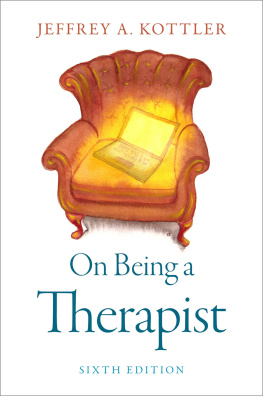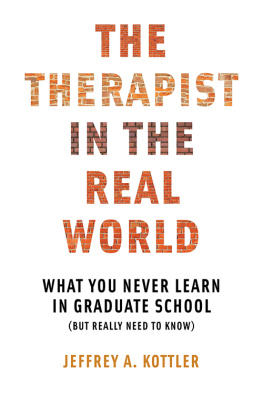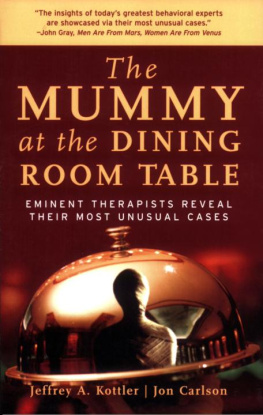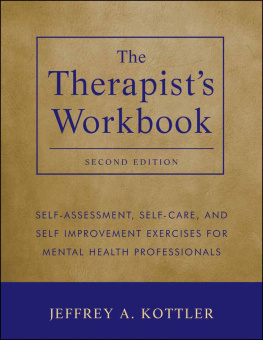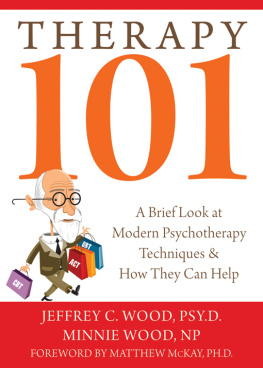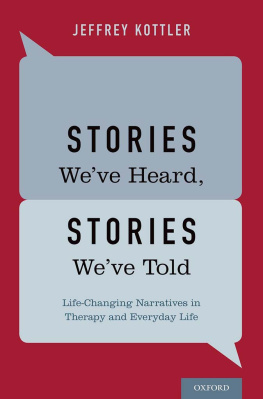On Being a Therapist

Oxford University Press is a department of the University of Oxford. It furthers the Universitys objective of excellence in research, scholarship, and education by publishing worldwide. Oxford is a registered trade mark of Oxford University Press in the UK and certain other countries.
Published in the United States of America by Oxford University Press
198 Madison Avenue, New York, NY 10016, United States of America.
Oxford University Press 2022
All rights reserved. No part of this publication may be reproduced, stored in a retrieval system, or transmitted, in any form or by any means, without the prior permission in writing of Oxford University Press, or as expressly permitted by law, by license, or under terms agreed with the appropriate reproduction rights organization. Inquiries concerning reproduction outside the scope of the above should be sent to the Rights Department, Oxford University Press, at the address above.
You must not circulate this work in any other form and you must impose this same condition on any acquirer.
CIP data is on file at Library of Congress
ISBN 9780197604458
eISBN 9780197604465
Contents
Practicing Counseling and Psychotherapy in the New World Order
Over the last century, there have been a handful of world events that have forever altered the nature of healthcare, particularly related to emotional and psychological difficulties. The 1918 flu pandemic led to the establishment of a national health service in the United States. The measles outbreak of the 1950s led to the development of vaccines as preventive measures. The number of shell-shocked veterans of World War I and battle fatigue conditions of World War II resulted in the first diagnoses and treatment of post-traumatic stress disorder. In addition, civil wars, terrorism, mass shootings, crime sprees, economic depressions, increased unemployment, racism, and especially pandemics and health threats have been known to significantly increase mental health problems. Often these crises have led to major breakthroughs, if not transformations, in the ways that healthcare has been delivered.
There have been times in history, especially most recently, when the ongoing ripple effects within the political arena have led to massive protests, increased feelings of alienation, as well as the erosion of trust, courtesy, and civility within our culture. The previous years have taken a toll on everyones mental health, leading to significant increases in depression, anxiety, economic disparity, suicide, crime, and violence. Even truth and facts are now considered open to debate, depending on ones political and religious convictions. Social movements and events like Black Lives Matter, the oppression of refugees and immigrants, not to mention the pandemic that killed millions of people and left half the world in economic misery, only increased the suffering and helplessness.
Yet during a time when people most neededyearnedfor intimate support and contact, masks, social distancing, and outright fear and avoidance made such deep connections difficult, if not impossible. Therapists, among so many other professionals, were often left with little alternative other than to deliver services via screens, mobile devices, or messaging. Within a period of weeks, all of a sudden, everything we ever learned and understood became obsolete, or at least radically changed. With minimal (if any) preparation, training, and supervision, clinicians were forced to pivot to therapeutic delivery systems for which we had only vague notions for what was considered best practices. Once the pandemic infections abated, vaccines were made possible, and dangers of physical contact were reduced, it was clear that counseling and psychotherapyas we previously understood and practiced itwere forever going to be different. Many practitioners decided to give up their offices altogether and work from home or else offer exclusively virtual or distance-based services. Many other practitioners decided that the convenience, cost-effectiveness, reduction of expenses, and preference of many clients required them to provide an altogether different menu of options. In addition, client groups such as indigenous and marginalized groups, deployed military personnel, and those who are economically disadvantaged or live in rural or isolated regions were finally able to seek greater access to mental health services for the first time.
Updating and revising this book about therapy for this latest edition, I had already been prepared to deal with some fairly important changes within the profession during the previous half decade. When I first decided to begin this work, I had no idea just how much a book about therapy orfor that matterany service profession would become unrecognizable in its current form. Who could have imagined a few years ago wed be talking to people about their deepest secrets and most pressing problems while staring at their faces on a computer, tablet, or phone? Whoever imagined that therapists wouldnt require offices any longer?
How all this will play out in coming years is both exciting, confusing, and, at least for some of us, a little disturbing. What has been welcomed and appreciated as convenient, accessible, and in some ways, uniquely helpful, is also limiting. For those who are doing distance therapy, we are missing essential data and cues that were previously available to us: a clients posture, scent, what the hands and feet are doing, where the person sits in the room, or who else is listening to the session. In addition, some of the most crucial parts of therapeutic change used to take place during the commute to and from sessions when clients would review and rehearse what they wanted to talk about, as well as the kaleidoscope of thoughts, feelings, and reactions that took place on the trip home. Once we have collected evidence, completed comparative studies, developed training and supervision programs, figured out jurisdictional matters and licensure to do this sort of work, we will understand a lot more about the respective advantages and limitations of various therapeutic options, which approaches, methods, and practices work best for which clients and difficulties. Meanwhileand fortunatelythe experience of being a therapist is still much the same.
Changes Are to Be Expected When We Are in the Business of Promoting Change
The climate for being a therapist has changed so dramatically that the field is all but unrecognizable to those who began their careers when the first edition of this book was published over 40 years ago. This was a time when clients were mostly white, female, and upper middle class; when therapy was believed to take a long time (at least months, if not years) to be considered viable; and when insurance companies would routinely pay 90% of whatever we charged, with no lifetime limit or restrictions on frequency of sessions.
Now we practice in an era when more indigent, immigrant, and working-class clients are being served, often presenting much more severe problems. During the global pandemic, not only were professionals faced with mortal threats to health and safety but also there was an epidemic of emotional difficulties and severe disturbances that resulted from economic collapse, loss of jobs, political instability, lack of accurate and reliable information, and uncertainty about the future, not to mention the quarantines, displacements, hardships, and even tragic loss of loved ones. Since we were unable to schedule sessions in person because of dangers of transmitting the virus, the whole structure of counseling and psychotherapy, as we used to understand it, changed overnight. How these options continue to evolve, coupled with therapy apps and online programs, is still open to much debate, but it is clear that the evolution of our field is taking place at a dizzying pace.

